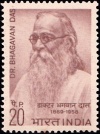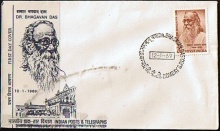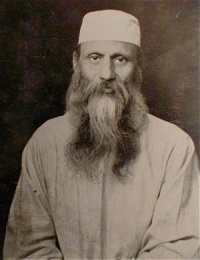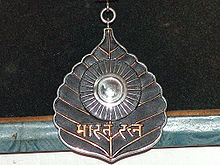Bhagavan Das
Bhagavan Das (1869-1958) was an Indian Theosophist and educator who served as General Secretary of the Indian Section and as Secretary of Central Hindu College.
NOTE: He should not be confused with an American yogi and singer using the same name, who is best known as the teacher of Ram Dass. Another Bhagwan Das (1927-2010) was an Ambedkarite and historian of the dalit movement.
Early years and education
Bhagavan Das was born in Varanasi, India on January 12, 1869 into a landholding family of bankers. An excellent scholar, he completed his B. A. at the age of sixteen and M. A. (Philosophy), in Calcutta, at eighteen.[1] After schooling he became a Deputy Collector, and magistrate in Uttar Pradesh from 1890 to 1899. [2][3] Later in life, he was honored with an LL.D (Doctor of Laws) degree at Benares and Allahabad. Some sources describe the honorary degree as a Doctorate in Literature, and he could well have received more than one honor.
Dr. Das's son, Sri Prakasa (3 August 1890 – 23 June 1971) was an Indian freedom fighter who became Governor of Assam (1949-1950), Governor of Madras (1952-1956), and Governor of Bombay (1956-1962).[4]
Work for the Theosophical Society
After hearing a speech given by Annie Besant he joined The Theosophical Society in 1894.[5] He collaborated with Mrs. Besant in many initiatives, but strongly opposed her exhaltation of Jiddu Krishnamurti as the World Teacher, and particularly the way in which participation in the Order of the Star in the East was promoted in Central Hindu University.[6] He wrote about that subject in his pamphlet, "The Central Hindu College and Mrs. Besant." He remained always loyal to the Theosophical Society, however, and served as General Secretary for the Indian Section. He made great contributions to Theosophical literature, and his best-known work is The Essential Unity of All Religions. One of his friends in the Society was Ananda Coomaraswamy[7]
Career as educator
Bhagavan Das joined the faculty of Central Hindu College in 1898, the year of its founding by Annie Besant.[8] He also served as Honorary Secretary of the Board of Trustees and Managing Committee.
In 1921, working with Babu Shiv Prasad Gupt, he founded the Kashi Vidya Pith, a national University which has since been renamed Mahatma Gandhi Kashi Vidyapith. He served as the first vice-chancellor. Mahatma Gandhi , Jawaharlal Nehru, and other prominent citizens were involved with the school's governance. "It was inaugurated by the father of our nation Mahatma Gandhi on the 10th of February 1921 during the non-cooperation movement of Indian freedom struggle. The university was established with the objective of enrichment of Hindi as a national language, staunch support to Indian socialism and nationalism, equality of all religions and commitment to democracy."[9]
In recent years it has become a public university with 227 colleges, serving hundreds of thousands of students.[10] The current objectives of the university, much in line with Theosophical principles, are "to strive to enhance and propagate:
- The development of Indian civilization & culture based on spiritualism.
- Homogeneous intermingling of all the sections of Indian society.
- Coordination among different thoughts and cultures.
- The notion of independence and patriotism along with the feeling of brotherhood & the urge to serve mankind.
- Ancient and modern development in the fields of various disciplines of learning , sculpture , science , technology etc."[11]
Political activism
Dr. Das was a very active supporter of Indian nationalism and freedom from British rule. "In 1921 Das was sentenced to one year imprisonment by the British for association with the Non-Cooperative Movement, but was released after only five weeks on a motion of the Government. For many years Das served on the All-India Congress Committee and was elected to the Legislative Assembly in Uttar Pradesh in 1934."[12] Like Gandhi, he opposed rioting as a form of protest.
Later years
Dr. Bhagavan Das died on September 18, 1958.
Awards and honors
In 1955, Dr. Bhagavan Das was awarded the Bharat Ratna, also called the gem of India, the Republic's highest civilian award for his achievements in literature and education.[13]
"A prominent road in New Delhi is named after him and a colony is also named after his name in Sigra area of Varanasi 'Dr. Bhagwan Das Nagar.'"[14] After his death, on January 12, 1969, India issued a stamp in commemoration. A centenary book was printed.[15]
 
|
The Dr. Bhagwandas Central Library, also known as the Bhagwandas Swadhyaypith, was established in the year 1921 at Kashi Vidya Pith, the first Indian university founded by Indians. "This library has a great collection of books of humanities, social sciences, and science.[16]
In 1900, he was awarded the Subba Row Medal by the Theosophical Society in recognition of his contributions to Theosophical literature.
Writings
Dr. Das wrote numerous books and pamphlets in English and Hindi, on a wide range of topics including Theosophy, Indian nationalism, education, and translations of Sanskrit texts. These are in alphabetic sequence:
- Ancient Solutions of Modern Problems. Adyar, India: Theosophical Publishing House, 1933.
- Ancient versus Modern "Scientific Socialism", or, Theosophy and Capitalism, Fascism, Communism. Adyar, India: Theosophical Publishing House, 1934. [2]
- Annie Besant and the Changing World. Adyar, India: Theosophical Publishing House, 1934.
- The Central Hindu College and Mrs. Besant, the Rise of the Alcyone Cult. London and Chicago: Divine Life Press, 1913. 25 pages. Signed in Benares, India on July 17, 1913. This pamphlet expresses his disappointment with Mrs. Besant in the way that Central Hindu College was made into Banaras Hindu University. It discusses the Order of the Star in the East in some detail, as is Mrs. Besant's insistence on a pledge of obedience to her among E. S. T. members; his perception of her as vindictive; his perception of neo-Theosophy; and the establishment of the Theosophical Educational Trust. Available at American-Buddha.com.
- Communalism and Its Cure by Theosophy, Or Spiritual Health, the Only Sure Basis of Material Wealth. Theosophical Publishing House, Adyar 1934. Theosophy Canada
- A Concordance Dictionary to The Yoga-Sutras of Patanjali. Benares: Kaashai, 1938.
- The Essential Unity of All Religions. Adyar, Madras, India: Theosophical Publishing House, 1932. Wheaton, IL, Theosophical Press, 1966, 1939. 683 pages. Other editions and publishers; also published in Hindi. This book is widely held in libraries throughout the world. It was the very first title issued under the Quest Books imprint of the Theosophical Publishing House in Wheaton, Illinois.
- The Dawn of Another Renaissance. Adyar, India: Theosophical Publishing House, 1931. Theosophy Canada
- The Ethico-Psychological Crux in Political Science and Art, or, Who Should be Legislators? Aydar, India: Theosophical Publishing House, 1931.
- Eugenics, Ethics and Metaphysics. Adyar, India: Theosophical Publishing House, 1930.
- A Few Truths about Theosophy. The Theosophist (September 1889) and Theosophical Siftings 3.9. Printed as a pamphlet by Theosophical Publishing House, London. A lecture delivered at a public meeting at Benares. #Available at Scribd.com.
- The Fundamental Idea of Theosophy. Adyar Pamphlets No 14. Madras: Theosophist Office, 1912. Available at Narod.ru.
- Indian Ideals of Women's Education. Madras: Current Thought Press, 1929.
- Krishna, a Study in the Theory of Avataras. Adyar, India: Theosophical Publishing House, 1924.
- The Metaphysics and Psychology of Theosophy. in The Theosophist, Adyar, 1916.
- Mystic Experiences. ca 1945.
- My Picture of Free India. Benares: Indian Book Shop, 1944.
- The Pranava-Vada of Gargyayana. Three volumes, with notes by Annie Besant. Adyar, India: Theosophical Publishing House, 1910-1913. Pranava-vāda is the Sanskrit for "uttering of Pranava (AUM)" Das alleges that the work is a "summarised translation" of an otherwise unknown "ancient text" by a sage called Gargyayana. Das states that the text was dictated to him from memory by one Pandit Dhanaraja, a theosophist friend of his who was blind in both eyes and had died before the book's publication.[17]
- The Philosophy of Non-Co-operation and of Spiritual-Political Swaraj. Madras: Tagore & Co., 1922.
- The Psychology of Conversion. Adyar, India: Theosophical Publishing House, 1917. Theosophy Canada
- The Religion of Theosophy. Adyar, India: Theosophical Publishing House, 1911. Pamphlet taken from a paper contributed to the Convention of Religions held in Allahabad, India, on the 9th, 10th and 11th of January 1911. Available at Theosophy Canada
- The Science of the Emotions. London: William Byles & sons, 1900 and Benares: Theosophical Publishing House, 1908. Available at Internet Archive.
- The Science of Peace. 1904, 1921. Third edition: Adyar, India: Theosophical Publishing House, 1948. Available in 1904 edition at Internet Archive, Internet Archive, and Internet Archive.
- The Science of Religion, or, Sanatana Vaidika Dharma, an Attempt at an Exposition of Principles. Benares: Indian Book Shop, 1948.
- The Science Of Social Organization, or, The Laws Of Manu In The Light Of Atma Vidya. Adyar, India: Theosophical Publishing House, 1910, 1935. Available at Internet Archive.
- The Spiritualisation of the Science of Politics by Brahma-Vidya. Adyar, India: Theosophical Publishing House, 1919.
- The Superphysics of the Great War. Adyar, India: Theosophical Publishing House, 1916.
Dr. Das also wrote for many Theosophical journals. The Union Index of Theosophical Periodicals lists 127 articles by or about the name Bhagavan Das.
Additional resources
- Das, Bhagavan in Theosophy World.
- Browning, K., An epitome of the "Science of the Emotions": A Summary of the Work of Pandit Bhagavan Das Published under that Title. London: Theosophical Publishing House, 1925.
- Ginsberg, Allen. Ah, Bhagavan Das Singing. 1972.
- Khanna, D. P. S. Dr Bhagwan Das as a Social Thinker. Delhi: Shree Publishing House, 1983. 244 pages. Exhaustive bibliography of Dr. Bhagwan Das's works, p. 241-244.
- Prakasa, Sri. Bharat-Ratna Dr. Bhagavan Das. Meerut, India: Meenakshi Prakashan, 1970. "Remembered by his son, Sri Prakasa."
- Rutherford, H. C. The Message of Bhagavan Das on the Present Significance of the Vedic Social Order. Richmond Hill, Surrey, England, 1962. "New Atlantis Foundation. Lecture".
- Shastri, Raja Ram, and others, Eds. Dr. Bhagavan Das, 1869-1969: a Centenary Volume. Varanasi: Kashi Vidyapith, 1969.
Notes
- ↑ "Das, Bhagavan," in Das, Bhagavan at Theosophy World..
- ↑ "Das, Bhagavan," in Das, Bhagavan at Theosophy World..
- ↑ "Life," at DrBagwandas.com.
- ↑ Elise Nisewanger letter to Richard Chesrow. January 3, 1958. Chesrow Family Collection. Records Series 25.23. Theosophical Society in America Archives.
- ↑ "Bhagavan Das," at Theosophy Canada web page.
- ↑ "Bhagavan Das," at Theosophy Canada web page.
- ↑ William W. Quinn, The Only Tradition (Albany, NY: State University of New York Press, 1997), 109-110.
- ↑ "Bhagavan Das," at Theosophy Canada web page.
- ↑ "List of Colleges in Mahatma Gandhi Kashi Vidyapeeth, Varanasi," Entrance Exams 2014 Education and Career in India at Entrance-exam.net.
- ↑ "MGKVP Varanasi" at Varanasi.org web page.
- ↑ "About Us," Mahatma Gandhi Kashi Vidyapith Varanasi web page.
- ↑ "Das, Bhagavan," in Das, Bhagavan at Theosophy World.
- ↑ Ministry of Home Affairs Padma Awards Directory (1954-2007)," at [1]
- ↑ "Dr. Bhagwan Das," at DrBhagwandas.com.
- ↑ "Dr. Bhagvandas" at IndianPost.com.
- ↑ "MGKVP Varanasi" at Varanasi.org web page.
- ↑ "Pranava-Vada of Gargyayana," at DrBhagwandas.com.

